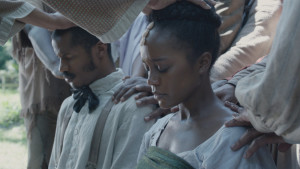There is such a fine line between justice and vengeance, no? And when it comes to questions of slavery, it’s hard to know what to root for. In so many cases, justice just doesn’t seem quite good enough, which is why we loved Django Unchained. But you have to know that vengeance will yield payback, sooner or later, which is why we strive for justice. Nat Turner’s slave rebellion as described by writer/director/rebel leader Nate Parker is one of vengeance, and I wish it had taken the tack of justice. Perhaps history favors Mr. Parker’s interpretation.
Racism both subtle and unsubtle is endemic within this film, as one might expect. The title The Birth of a Nation was a strategic co-opting of the classic silent film from 1915. With a combination of groundbreaking film technique and groundbreaking racism, D.W. Griffith created a film that was in its way part masterpiece and part jaw-gaping embarrassment. This re-Birth, so-to-speak, describes a world in which white folk are measured in degrees of evil, a photonegative contrast to the pro-Klan propaganda piece Griffith imagined. It should be noted right off the bat that “Turner” was name of Nat’s owner; even calling this piece of history the Nat Turner rebellion is a subtle form of racism.
Nat Turner (Parker) was a slave on a Virginia cotton plantation in the early 19th century. As with most childhood prologue films, this one just hits the highlights of young Nate: a refusal to sell out his father; his father is murdered all the same. Soon afterwards, the precocious child was recognized for having smarts and became one of the rare slaves who learned to read, although his education was confined entirely to The Bible; naturally, he becomes a preacher.
Adult Nat is constantly of two worlds – the one where he’s a slave and knows in his heart that everything the white man demands is an incarnation of evil. On the other hand, he is a slave and thus has no choice but to obey. And when Samuel Turner (Armie Hammer) finds profit to be made in having a slave speak to peers about biblically-mandated obedience, well, the Nat Turner Fealty Tour is off and running full speed.
Birth of a Nation is more of a tell-than-show film. I think this was a huge mistake. In fact, the greatest pool of blood in the film, if memory serves, is young Nat’s finger stung by the nettle – the boy was being introduced to he cotton fields for the first time. In the adult portion of this film, pain is directed almost entirely through expression rather than deed. A whip is shown. A whip is wielded, but we don’t see the immediate product, just the expression. Rarely do we even get that much action. Most of the true grief in this circumstance of time and place is concentrated either in Nat’s estrangement from his wife (Aja Naomi King) or, more importantly, his inner struggle between obedience and what he clearly sees as selling out by preaching compliance in the face of evil.
For all the slavery, there are precious few shots of slaves being truly overworked or mistreated. “Precious few” may be a poor exaggeration; this film certainly didn’t say slaves had it easy by any stretch, but what you have to understand is I want to root for rebellion. For one thing, I kept wondering where the slaves found the energy to meet. From what I understand, slavery was a 24/7 job. Sunup to sundown and even beyond in a full moon. No rest. No energy to be free, much less freedom itself. Sadly, I kept hoping for more atrocity in graphic detail. Please show me the justification; I’m 100% in your corner. Get me riled up. Show me that justice must be served.
energy to be free, much less freedom itself. Sadly, I kept hoping for more atrocity in graphic detail. Please show me the justification; I’m 100% in your corner. Get me riled up. Show me that justice must be served.
Mr. Parker, you realize that to many, many white folks, Act III is a horror film, right? Being murdered in the security one’s own bed while sleeping? This is what slavers and slave owners feared more than anything else. It’s not a leap to say this is a similar fear to that which drives many 2nd Amendment fans today, nor is it dissimilar to the fear that created the Trump Presidential run. Hence, you see the danger, right? If you show people murdered in their beds, you better have 100% justification. It’s for this reason I feel slighted that Birth of a Nation often pulled its punches – aside from one very grisly force-feeding scene, I felt the movie cheated me of anger more often than not. I’m on your side; I’m not entirely sure Nate Parker’s choice to cast himself was the best one, but regardless, I’m with you, Nate. Show me justice, not vengeance. Personally, I wanted a little more.
Work all the livelong day for a handful of gruel
Only was beat twice this week; massah’s far from cruel
Sure, the pigs and horses are housed better than I
Ain’t nobody on this plantation seekin’ to justify
My wife was sold two counties over; may not see her again
Hope I recognize my own child if or, luckily, when
Had I pass or the equipment, I’d walk a mile in another’s shoes
Until then, all I own myself is the American slavery blues
Rated R, 120 Minutes
D: Nate Parker
W: Nate Parker
Genre: Disturbing history
Type of person most likely to enjoy this film: African Americans
Type of person least likely to enjoy this film: Trump supporters



